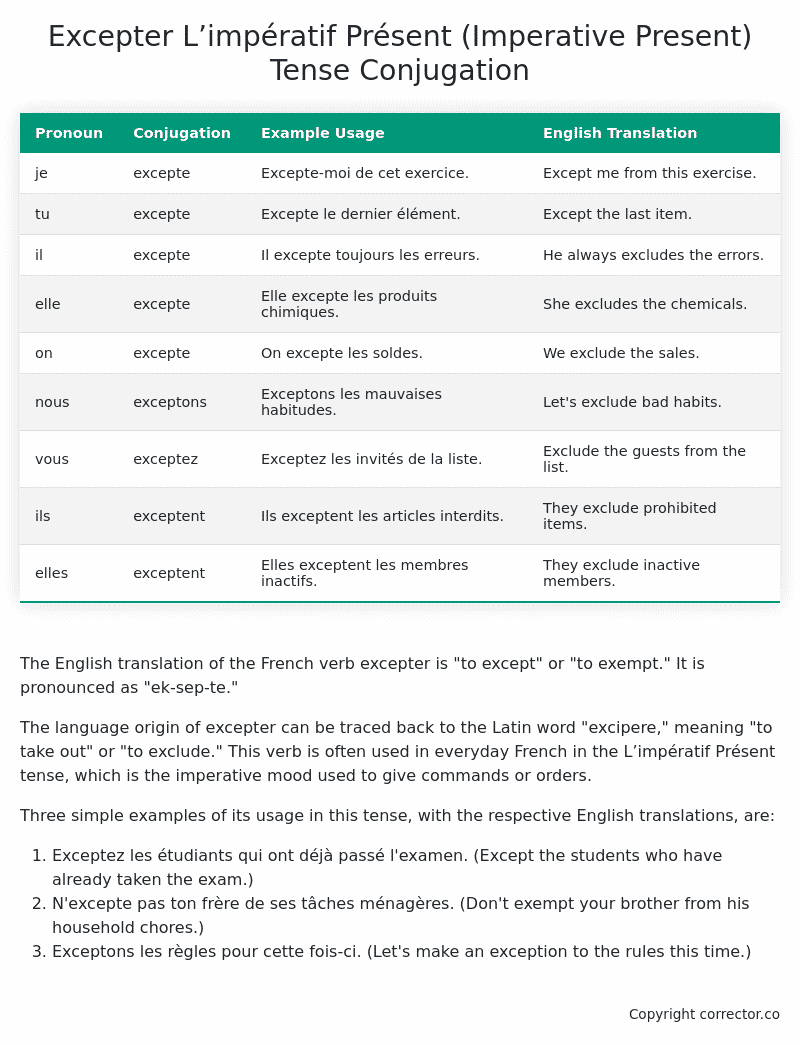L’impératif Présent (Imperative Present) Tense Conjugation of the French Verb excepter
Introduction to the verb excepter
The English translation of the French verb excepter is “to except” or “to exempt.” It is pronounced as “ek-sep-te.”
The language origin of excepter can be traced back to the Latin word “excipere,” meaning “to take out” or “to exclude.” This verb is often used in everyday French in the L’impératif Présent tense, which is the imperative mood used to give commands or orders.
Three simple examples of its usage in this tense, with the respective English translations, are:
- Exceptez les étudiants qui ont déjà passé l’examen. (Except the students who have already taken the exam.)
- N’excepte pas ton frère de ses tâches ménagères. (Don’t exempt your brother from his household chores.)
- Exceptons les règles pour cette fois-ci. (Let’s make an exception to the rules this time.)
Table of the L’impératif Présent (Imperative Present) Tense Conjugation of excepter
| Pronoun | Conjugation | Example Usage | English Translation |
|---|---|---|---|
| je | excepte | Excepte-moi de cet exercice. | Except me from this exercise. |
| tu | excepte | Excepte le dernier élément. | Except the last item. |
| il | excepte | Il excepte toujours les erreurs. | He always excludes the errors. |
| elle | excepte | Elle excepte les produits chimiques. | She excludes the chemicals. |
| on | excepte | On excepte les soldes. | We exclude the sales. |
| nous | exceptons | Exceptons les mauvaises habitudes. | Let’s exclude bad habits. |
| vous | exceptez | Exceptez les invités de la liste. | Exclude the guests from the list. |
| ils | exceptent | Ils exceptent les articles interdits. | They exclude prohibited items. |
| elles | exceptent | Elles exceptent les membres inactifs. | They exclude inactive members. |
Other Conjugations for Excepter.
Le Present (Present Tense) Conjugation of the French Verb excepter
Imparfait (Imperfect) Tense Conjugation of the French Verb excepter
Passé Simple (Simple Past) Tense Conjugation of the French Verb excepter
Passé Composé (Present Perfect) Tense Conjugation of the French Verb excepter
Futur Simple (Simple Future) Tense Conjugation of the French Verb excepter
Futur Proche (Near Future) Tense Conjugation of the French Verb excepter
Plus-que-parfait (Pluperfect) Tense Conjugation of the French Verb excepter
Passé Antérieur (Past Anterior) Tense Conjugation of the French Verb excepter
Futur Antérieur (Future Anterior) Tense Conjugation of the French Verb excepter
Subjonctif Présent (Subjunctive Present) Tense Conjugation of the French Verb excepter
Subjonctif Passé (Subjunctive Past) Tense Conjugation of the French Verb excepter
Subjonctif Imparfait (Subjunctive Imperfect) Tense Conjugation of the French Verb excepter
Subjonctif Plus-que-parfait (Subjunctive Pluperfect) Tense Conjugation of the French Verb excepter
Conditionnel Présent (Conditional Present) Tense Conjugation of the French Verb excepter
Conditionnel Passé (Conditional Past) Tense Conjugation of the French Verb excepter
L’impératif Présent (Imperative Present) Tense Conjugation of the French Verb excepter (this article)
L’infinitif Présent (Infinitive Present) Tense Conjugation of the French Verb excepter
Struggling with French verbs or the language in general? Why not use our free French Grammar Checker – no registration required!
Get a FREE Download Study Sheet of this Conjugation 🔥
Simply right click the image below, click “save image” and get your free reference for the excepter L’impératif Présent tense conjugation!

Excepter – About the French L’impératif Présent (Imperative Present) Tense
Usage
Giving commands
Making requests
Offering advice
Expressing desires
Conjugation Formation
Interactions with other tenses
Want More?
I hope you enjoyed this article on the verb excepter. Still in a learning mood? Check out another TOTALLY random French verb conjugation!


